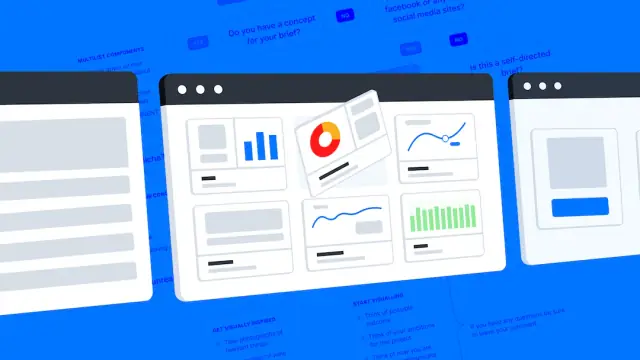How to Develop Care Management Software?
Discover the essentials of creating care management software, including the features and functionalities in demand, tips for effective implementation, and how no-code platforms can simplify the development process.

Understanding Care Management Software
Care management software is a digital solution that enables healthcare providers and professionals to monitor, coordinate, and optimize patient care. These software solutions aid in the organization and delivery of healthcare services, helping practitioners collaborate, share information, and make informed decisions for patients.
At its core, care management software promotes improved patient outcomes, reduces the burden on healthcare professionals, and streamlines administrative tasks. By automating certain processes and providing easy access to essential information, care management software helps healthcare organizations to maintain high-quality care while increasing efficiency and reducing costs.
The Core Features Every Care Management Platform Needs
To create an effective care management software, developers must implement certain core features vital to supporting the unique needs of healthcare professionals and patients alike. The following key functionalities should be considered when developing care management software:
Electronic Health Records (EHR) Integration
An essential aspect of any care management platform is the ability to integrate with electronic health records. This feature allows healthcare professionals to access, store, and manage patients' medical histories, test results, diagnoses, and treatment plans in a unified platform. Integrating EHRs into care management software ensures that healthcare providers can easily access and update crucial information, improving care coordination and reducing the risk of errors associated with manual data entry.
Care Planning
A comprehensive care management platform should include a care-planning module that guides healthcare professionals in creating personalized care plans for each patient. This feature enables providers to establish clear goals and objectives, track patient progress, and adjust care plans as needed. Moreover, by documenting each care process step, care planning tools enhance communication and collaboration among healthcare professionals.
Care Coordination
Collaboration among healthcare providers is essential for quality patient care; therefore, care management software must enable care coordination. This feature allows multi-disciplinary teams to collaborate on patient care, share information, and stay informed about each patient's progress and status. A well-designed care coordination module streamlines communication and reduces the potential for miscommunication or medical errors.
Patient Engagement Tools
Effective care management requires patients to be actively involved in their care process. Patient engagement tools, such as patient portals and secure messaging systems, help facilitate communication between patients and providers. These features empower patients to stay informed about their care plans, access educational materials, and track their progress, leading to better outcomes.
Appointment Scheduling
Streamlining the appointment scheduling process is an important feature for care management software. With an easy-to-use scheduling interface, healthcare providers can set up, modify, and cancel appointments, while minimizing scheduling errors and reducing missed appointments. Efficient scheduling ensures optimal clinic workflows and timely patient care, leading to better patient experiences and outcomes.
Progress Tracking and Reporting
Establishing systems for patient progress tracking and reporting is crucial to measure the effectiveness of care management interventions. This feature allows healthcare professionals to monitor patients' progress toward care goals and identify areas for improvement. It also enables the generation of reports that can be shared among care teams, providing valuable insights for ongoing care evaluation and optimization.

Challenges in Developing Care Management Software
Developing care management software can be a complex task due to the specialized needs of the healthcare industry. Developers must address several challenges to ensure their solution is both effective and compliant with healthcare standards and regulations:
- Catering to Diverse Patient Populations and Medical Requirements: Different patient populations have varying medical requirements, which need to be considered when creating care management software. Developers must ensure their solution can handle the specific needs of different target user groups, accounting for factors such as age, medical conditions, complex care processes, and social determinants of health.
- Ensuring Software Usability for Healthcare Professionals: Healthcare professionals are often time-constrained, so care management software must be user-friendly, intuitive, and efficient. Developers should prioritize creating an interface that simplifies complex processes and reduces time-consuming manual work, while allowing quick access to essential information needed for effective decision-making.
- Maintaining Data Security and Privacy: Given the sensitive nature of healthcare information, patient data security and privacy must be at the forefront of any care management software solution. Developers need to implement strong security mechanisms, such as encryption and access controls, to prevent data breaches and ensure compliance with relevant regulations, including GDPR and HIPAA.
- Integrating with Existing Systems and Data: Integrating existing systems, such as EHRs, practice management software, and other healthcare applications, is crucial for a seamless care management process. Developers must ensure their solution can communicate with these systems and import/export data as required, enabling care providers to consolidate information from multiple sources into one unified platform.
Despite these challenges, developing care management software can be rewarding as it supports better patient care and improves healthcare outcomes. By addressing these challenges and incorporating essential features, developers can create an effective solution that enables healthcare professionals to deliver high-quality care more efficiently and effectively.
Advantages of Using No-Code Platforms for Care Management Development
In recent years, the adoption of no-code platforms has increased, significantly simplifying the software development process for both technical and non-technical users. Care management software can also benefit from these platforms, which offer numerous advantages for developers and healthcare organizations.
Reduced Development Time and Costs
No-code platforms can substantially decrease the time and costs of developing care management software. By eliminating the need for complex coding, teams can quickly build and deploy their applications. A shorter development timeline means reduced labor costs and a faster return on investment.
Increased Flexibility and Customization
No-code solutions offer greater flexibility and customization options than off-the-shelf care management software. Instead of trying to adapt an existing solution to accommodate your organization's specific needs, you can build tailored software from the ground up to meet your unique requirements and preferences.
Streamlined Planning and Iterative Improvements
Healthcare organizations are continuously improving and adapting their care management processes. No-code platforms make it easy to iterate upon and update your care management software to reflect these changes, giving you the agility to seamlessly adopt new strategies or technologies.
Enhanced Collaboration
Healthcare professionals without prior software development experience can collaborate closely with their development teams using no-code platforms. This collaboration ensures that the end product aligns with clinicians' needs and expectations by incorporating their valuable insights and suggestions during development.
Reduced Maintenance Overhead
Maintaining and evolving a custom-developed care management software can be a significant endeavor. No-code platforms help minimize maintenance overhead and ensure that applications stay up-to-date with new requirements, technology advances, and care protocols. This results in a more sustainable solution for your organization.
Creating Your Care Management Software with AppMaster
AppMaster is a powerful no-code platform that enables you to create comprehensive care management software solutions encompassing backend, web, and mobile applications. By leveraging AppMaster.io's powerful features and capabilities, you can rapidly design and deploy a care management application tailored to your organization's needs. Here's a step-by-step guide to creating your care management software using AppMaster:
Define Your Scope and Functional Requirements
Start by identifying the processes you want to cover within your care management software. List the core features you need to address, such as electronic health records integration, care planning, appointment scheduling, and patient engagement tools. This information will act as a guideline during the development process.
Utilize Pre-built Templates and Components
AppMaster offers many pre-built templates and components specifically designed for healthcare applications. Browse their library to find components that match your requirements, and incorporate them into your care management software.
Customize the User Interface Design
Using the AppMaster drag-and-drop interface, customize the software's user interface to fit the preferences of your healthcare providers and patients. Ensure that the interface is intuitive and user-friendly, facilitating seamless adoption of your care management solution.

Develop Custom Business Logic
For more complex or unique requirements, AppMaster provides intuitive visual Business Process (BP) designers to create custom business logic. Implement your desired workflows and automate actions using the BP designer to optimize your care management processes.
Integrate Your Care Management Software with Existing Systems
Smooth integration with existing systems, such as electronic health records, is crucial for the success of your care management solution. AppMaster supports seamless integration, allowing you to easily add and configure API endpoints to communicate with other systems.
Test and Deploy Your Application
Once the development process is complete, thoroughly test your care management software before deployment. AppMaster generates source code and compiles applications automatically, running tests to ensure the integrity of your application. Review the results and make adjustments as necessary to ensure a smooth user experience.
Maintain and Expand Your Care Management Solution
As your organization grows and evolves, leverage AppMaster's capabilities to maintain and expand your care management software. This includes adjusting existing components, adding new features, or refining existing functionality to better suit your needs.
Using a no-code platform like AppMaster, even healthcare organizations with limited software development expertise can create comprehensive care management solutions that empower healthcare providers to enhance patient outcomes. By leveraging AppMaster's tools, you can bring your vision of streamlined, effective care management to life.
FAQ
Care management software is a digital tool that empowers healthcare providers and professionals to monitor, coordinate, and optimize patient care. It consolidates medical records, streamlines care plans, and supports communication among healthcare teams.
Essential features for care management software typically include electronic health records integration, care planning, care coordination, patient engagement, appointment scheduling, progress tracking, and reporting tools.
Developers must deal with diverse patient populations, varying medical requirements, ensuring software usability for healthcare professionals, maintaining data security, and integrating with existing systems like electronic health records.
No-code platforms like AppMaster offer a visual interface to create software, reducing the need for complex coding. They provide pre-built templates, drag-and-drop interfaces, and a library of components to streamline the development process.
Yes, AppMaster is a flexible no-code platform that allows you to create care management software solutions utilizing backend, web, and mobile application components. Its visual design tools make for rapid development and easy customization.





